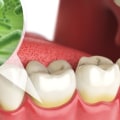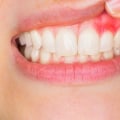To keep your gums and teeth healthy and avoid other oral health problems, regular dental care visits are essential. Poor dental health is also linked to a number of health problems, including diabetes, kidney disease, and heart disease. Routine dental checkups are about total health care, not just your teeth. Good dental health is a combination of proper daily maintenance (brushing and flossing) along with regular visits to your dental professional.
Normally, the body's natural defenses and good oral health care, such as daily brushing and flossing, keep bacteria under control. However, without proper oral hygiene, bacteria can reach levels that could cause oral infections, such as tooth decay and gum disease. Reduce Cancer Risk Another health problem related to oral health is cancer. Research has found that having a gum disease called periodontitis can play a role in the development of pancreatic cancer.
Periodontitis damages the tissue around your teeth, and the bacteria that cause it can be dangerous. Another study found that adults who had poor oral health were more likely to get an oral virus that can cause human papillomavirus (HPV), which can also cause cancer. Reduce the risk of dementia An estimated 40 million people live with Alzheimer's or another form of dementia worldwide. Research has found that a species of bacteria that forms in the mouth can travel to the brain and destroy nerve cells.
According to the National Institute for Dental and Craniofacial Research, nearly 11 percent of people 65 and older have moderate to severe gum disease. Poor dental care during pregnancy is linked to preterm birth, growth restriction in the uterus, gestational diabetes, and preeclampsia, a serious condition involving high blood pressure in pregnant women, according to the American Dental Association. In a dental exam, the dentist will look for damaged teeth, signs of tooth decay, gum condition, signs of teeth grinding, and more. It's also best to schedule regular dental checkups every six months to ensure good oral health and hygiene.
Together, they can prevent many dental problems from causing a decline in quality of life and potential medical complications. Systemic diseases, such as diabetes, often begin to manifest as an injury to the mouth or other dental problems, such as a gum infection. Exams and dental cleaning can help detect any oral conditions or health complications caused by oral diseases. Thanks to modern dental technology, treating tooth decay, especially in the early stages, is often only mildly uncomfortable, at its worst.
These bacteria can usually be controlled with proper dental care and the body's own defenses, such as saliva. Community-based water fluoridation and dental sealant programs in schools are two of the main evidence-based interventions to prevent tooth decay. Prevent and control oral and craniofacial diseases, conditions, and injuries, and improve access to preventive services and dental care.



